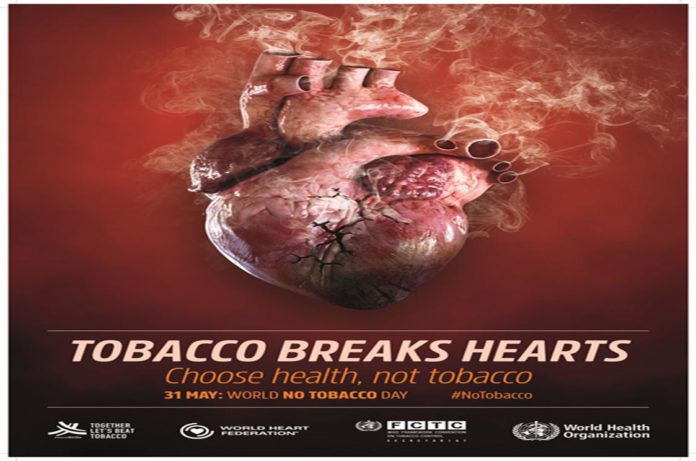Today is “World No Tobacco Day” and the WHO Regional Director for Africa, Dr Matshidiso Moeti, has revealed that the tobacco epidemic is killing more than 7 million people in the world each year and that in Africa about 146,000 adults aged 30 years and above die every year from tobacco-related diseases. Below is the full text of the message.
Every year on 31 May, WHO and its partners observe World No Tobacco Day to highlight the dangers associated with using tobacco, and to press for policies to reduce tobacco use. This year’s theme: “Tobacco and heart disease,” focuses on tobacco use as a key risk factor for developing heart and related diseases, including stroke.
The tobacco epidemic is one of the biggest public health threats the world has ever faced, killing more than 7 million people each year. Tobacco breaks hearts. Tobacco use and exposure to second-hand smoke contribute to about 12% of all heart disease deaths. There is no safe level for people, particularly children, women and workers, who have to be in the same room as smokers.
In the African Region, about 146 000 adults aged 30 years and above die every year from tobacco-related diseases. When tobacco users die prematurely in their productive years, families lose loved ones and income, and economic development is negatively affected.
Although concrete actions and measures exist to stem the tide of tobacco related diseases, more needs to be done to further raise awareness about the harmful effects of tobacco use. Many people are unaware that tobacco is one of the leading causes of heart disease and stroke.
Policies that regulate tobacco, promote smoke-free environments and encourage people to quit smoking will contribute to improving the health and well-being of all people. This requires strong leadership, political commitment and an informed civil society working together to press for heart-healthy policies and the right to health.
World No Tobacco Day is a chance for governments and the public to take firm action. Today, I call upon Member States to implement measures which we know will strengthen tobacco control as found in the WHO Framework Convention on Tobacco Control.
Effective measures to reduce tobacco demand which can be accomplished in a short time and at reasonable cost include increasing tobacco taxes and prices, which will save lives as well as generate money for governments. Other steps include creating completely smoke-free indoor workplaces and public places, instituting hard-hitting warnings and graphic pictures about the dangers of smoking on cigarette packaging, and banning tobacco advertisement, promotion and sponsorship.
In addition, every person can play a role in promoting healthy hearts by committing not to use tobacco, helping others to quit, and protecting all people, including family members, workers and children, from tobacco smoke.
Eliminating tobacco use will help to protect hearts from breaking. Let us choose health, not tobacco.



















